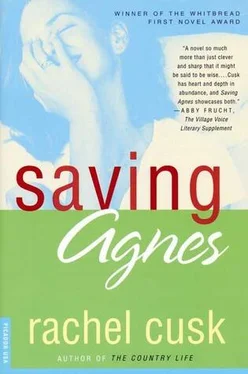As they walked into the courtyard, straining and chaffing like strangers, it all became sadly plain: this addiction, this great mistake, this misdiagnosis that was love.
Henry VIII, many-headed and self-perpetuating, regenerated lives and wives like an earthworm. Agnes felt they would have understood each other well, she and this builder of mazes; his house a virtual reality of simulated tricks, with its secret gardens and hidden doors, corridors of lust and back passages of intent. It spoke of a mistrust she shared. They would indeed have got on well; both lovers, neither beloved.
She perused their portraits: six wives, love’s carrion. She and Henry could have compared notes. Henry VIII, in love with love, fat with the flesh of women. There was, she knew, no satisfaction for that kind of hunger. Like her, what he sought was but his own reflection. What he fought for was but the survival of his own fittest self. He looked for love and he found a beast; and the beast was no one but himself. The nature of the beast, then and now, was that it destroyed what it craved the most.
The courtyards boring through the centre of the house gave the surrounding buildings a prisonish look, their windows bound with steel bodices through which wan, womanly faces might be supposed to peer. These orifices, together with the several low doors which studded the walls at regular intervals, seemed almost elided by the lacy skirts of mosaic and brick, through which the leering tongues of gargoyles erupted beside stony cameo faces trapped like sailors behind portholes. Above, pairs of narrow chimney stacks soared to the sky like outflung legs, cross-bound and gartered. Straggling groups of late tourists hovered uncertainly in the October sunlight.
Agnes saw her lover disappearing beneath a cool arch at one end of the courtyard and followed behind at a safe distance. Once inside, she discovered a great stone staircase which appeared to lead to the body of the house, and the sound of receding footsteps furthermore informed her that he was but a short distance ahead. She climbed the stairs quietly. He had seemed distant and inclined to solitude, and she did not want to jettison what she knew was her last chance by yapping at his heels like a vexing dog. Reaching the landing, she caught him drifting into one of the vast drawing-rooms, and she watched him from the doorway as he paused in front of a large canvas. On it, a naked woman reclined against a grassy bank, the geography of her copious flesh bruised and mountainous compared to the manicured green of her setting. Agnes felt rather offended that he should so mysteriously choose to contemplate such an object — and she in all her lissome superiority so close at hand!
She crossed the room quietly and stood by him, the breath of acknowledgement between them as faint as that of two strangers at an art gallery, each cowed into dalliance by the erudition of the other.
‘She’s beautiful,’ Agnes ventured, hoping with the lie to provoke a denial which would affirm both her charity and her own charms. Moments later, casting a glance beside her to check upon the progress of her missile, she saw it had been vainly fired. He had sauntered off, leaving but a mirage of scent and an airy bodily impression behind him.
When she was younger, she had used to indulge in romantic daydreams concerning the as yet unspecified character of her future partner. She had wondered where he was and what he was doing, and had vaguely hoped by such contemplation to establish psychic links between them which might one day render him more securely hers. She wondered now if she had ever been visualised thus in a stranger’s mind. Beams of sunlight slanted across the empty room, whirled with motes of dust. It seemed important, just then, that she should be tethered here by something stronger; that being here was part of something larger, someone else’s plan.
She no longer observed the future as if from the passenger seat of an aeroplane: a pleasant trip, with but the slightest frisson of fear, to a certain and even more pleasant destination; the high peaks of mountains in view, with fluffy clouds obfuscating the terrible plunge to their craggy feet. Now she was earth-bound and afraid, grinning stupidly at the sky and wondering how things stayed up there. She fingered her future like a set of flimsy negatives: a world of dark skies, glaring shadows, black smiles and certain death.
Agnes Day was lost, but only in so much as her lover was not to be found. She wandered down a long corridor and read from a sign that Anne Boleyn had fled over those very boards after receiving news of her imminent execution. For reasons which did not require elucidation, the passage had been named the Screaming Gallery.
Anne Boleyn had six fingers, Agnes recalled. Despite her deformity, Henry had loved her passionately. She wondered how he felt as her head thudded to the ground. It was an act of power, but also perhaps one of love. She thought of the desecrated Anne. To be so loved — what must it feel like?
She perused the tapestried dining-hall and imagined it full of bearded men spearing unspecified cuts of meat with knives. She examined faded tapestries depicting one-dimensional horses and women with shrunken bodies and enormous heads like embryos. She had hoped he would see her thus absorbed and be impressed by her self-sufficiency. After a while, however, she grew tired of her attentive posture and set out towards the kitchens, as if there might be some titbit there to comfort her.
Some time later, lodged in a circuitous passage like something indigestible, she knew she was lost. She retraced her steps and recognised nothing surrounding her. She hadn’t been paying attention. The corridor was deathly quiet and she supposed she must have wandered into a tourist backwater at the back of the house. She sat down on a step and remembered a time when her parents had taken her to a market in Mexico, where they had gone for a family holiday. It was dark, and they were cruising the chattering streets in a leisurely manner before dinner, fingering the stalls in a desultory way but really there to absorb the music and cheerful banter, the foreign faces and smells of cooking. They had all been rather uplifted by the scene, she remembered, until they had come upon a stall selling silver jewellery where Agnes, aged six and voraciously acquisitive, had become fixated by a small ring with a blue stone.
She had asked at first politely for a deal to be struck in her favour, and once refused had offered bravely to sacrifice several weeks of future pocket money in its preferment. Her father, who knew perhaps from experience better than to broker in futures, had cruelly cited the several smaller and inferior purchases with which her pockets were already filled. Had she known then, she calmly explained, what awaited her now, she would never have squandered her means so thoughtlessly. Her father had seemed to find this an amusing reply, and had claimed it was an apposite enough description of life. Far from rewarding her for her philosophy, however, the adult party had shortly after wandered off to sample other diversions. The assumption that she would merely follow behind them inflamed her with rebellion. She stayed exactly where she was, despite the grinning stallholder’s increasingly frantic and incomprehensible gesticulations in the direction of her retreating parents’ backs. Some time later, when they did not return, her sensations of power began quickly to evaporate; and compounded by the double blow of the failed purchase, which had created in its wake an aversion to what was already hers, she became engulfed by misery.
Finally she had run after them, but the scene which only minutes ago had seemed so bright soon became dark and menacing. Her family was nowhere to be seen amongst the leering faces, their putative cries drowned by jangling music and harsh foreign voices. She darted down alleyways and through unfamiliar squares until finally she had sat down on a step and cried at her punishment; for that, surely, was what it was? She had ceased to please them and they had dropped her in the street like an empty sweet-wrapper, never to return.
Читать дальше












